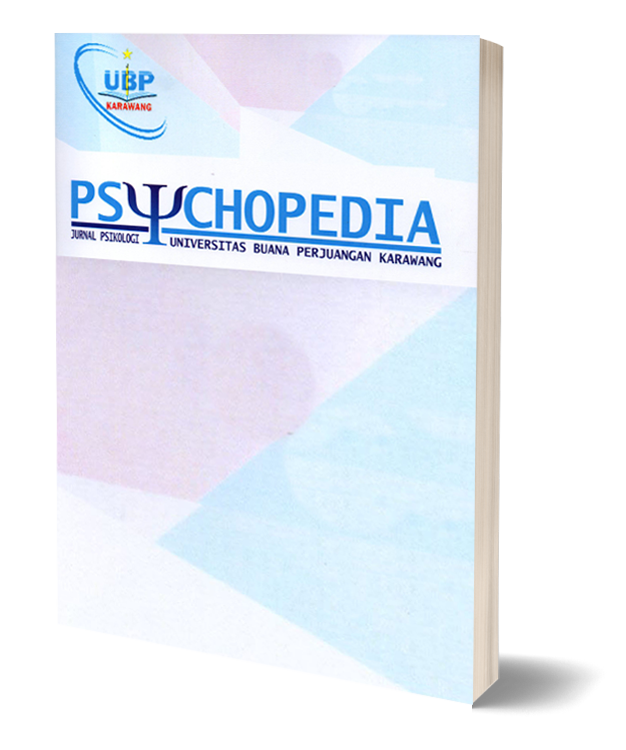MENULIS CATATAN HARIAN SEBAGAI METODE EFEKTIF DALAM MENINGKATKAN REGULASI EMOSI MAHASISWA
DOI:
https://doi.org/10.36805/psychopedia.v10i1.10477Keywords:
Journaling, Emotion Regulation, StudentsAbstract
This study aims to examine the effectiveness of journaling in improving emotion regulation among university students. Students often face academic pressures that trigger stress, anxiety, and frustration, requiring adaptive emotion management strategies. This research employed an experimental design using a pretest-posttest control group approach. Twenty students were randomly assigned into two groups: an experimental group that journaled daily for one week and a control group that did not engage in the activity. The results indicated that the experimental group showed a significant improvement in emotion regulation abilities compared to the control group, as evidenced by the Wilcoxon test (Asymp. Sig. = 0.005). However, the Mann-Whitney U test revealed no statistically significant difference between the experimental and control groups (Asymp. Sig. = 0.427), likely due to the small sample size and the short duration of the intervention. These findings demonstrate that journaling can help individuals understand and manage their emotions. Therefore, journaling can serve as a simple yet beneficial strategy for students to cope with academic stress and enhance their emotional well-being.
Penelitian ini bertujuan untuk menguji efektivitas menulis catatan harian dalam meningkatkan regulasi emosi pada mahasiswa. Mahasiswa sering menghadapi tekanan akademik yang memicu stres, kecemasan, dan frustrasi, sehingga membutuhkan strategi pengelolaan emosi yang adaptif. Penelitian ini menggunakan desain eksperimen dengan pendekatan pretest-posttest control group design. Sebanyak 20 mahasiswa dibagi secara acak menjadi dua kelompok, yaitu kelompok eksperimen yang menulis catatan harian selama satu minggu dan kelompok kontrol yang tidak melakukan aktivitas tersebut. Hasil penelitian menunjukkan bahwa kelompok eksperimen mengalami peningkatan signifikan pada kemampuan regulasi emosi dibandingkan kelompok kontrol, seperti yang ditunjukkan oleh hasil uji Wilcoxon (Asymp. Sig. = 0,005). Namun, uji Mann-Whitney U menunjukkan bahwa perbedaan antara kelompok eksperimen dan kontrol tidak signifikan secara statistik (Asymp. Sig. = 0,427), yang kemungkinan disebabkan oleh ukuran sampel yang kecil dan durasi intervensi yang singkat. Temuan ini membuktikan bahwa menulis catatan harian dapat membantu individu memahami dan mengelola emosi mereka. Dengan demikian, menulis catatan harian dapat menjadi strategi sederhana yang bermanfaat untuk membantu mahasiswa mengatasi tekanan akademik dan meningkatkan kesehatan emosional mereka.
Downloads
References
Argudo, C. (2021). Expressive writing: Reflecting on emotional experiences and problem-solving. Journal of Emotional Well-being, 19(2), 115-130.
Gross, J. J. (1998). The emerging field of emotion regulation: An integrative review. Review of General Psychology, 2(3), 271-299. https://doi.org/10.1037/1089-2680.2.3.271
Gross, J. J. (2002). Emotion regulation: Affective, cognitive, and social consequences. Psychophysiology, 39(3), 281–291. https://doi.org/10.1017/S0048577201393198
Gross, J. J., & John, O. P. (2003). Individual differences in two emotion regulation processes: Implications for affect, relationships, and well-being. Journal of Personality and Social Psychology, 85(2), 348–362. https://doi.org/10.1037/0022-3514.85.2.348
Gross, J. J., & Thompson, R. A. (2007). Emotion regulation: Conceptual foundations. In J. J. Gross (Ed.), Handbook of Emotion Regulation (pp. 3–24). New York: Guilford Press.
Sheppes, G., Suri, G., & Gross, J. J. (2011). Emotion regulation and psychopathology. Annual Review of Clinical Psychology, 7, 379–405. https://doi.org/10.1146/annurev-clinpsy-032210-104502
Gross, J. J. (2014). Handbook of emotion regulation (2nd ed.). The Guilford Press.
Gross, J. J. (2015). Emotion regulation: Current status and future prospects. Psychological Inquiry, 26(1), 1–26. https://doi.org/10.1080/1047840X.2014.940781
Kadi, A. R., Bahar, H., & Sunarjo, I. S. (2020). Hubungan Antara Regulasi Emosi Dengan Stres Akademik Pada Mahasiswa Fakultas Kedokteran Universitas Halu Oleo Relationship Between Emotion Regulation With Academic Stress On Students Of Medical Faculty.
Kristina, A. (2022). Expressive writing as a psychological benefit: Reducing stress, anxiety, and depression in nursing students. Journal of Nursing Education, 59(3), 214-222.
Lepore, S. J. (1997). Writing about emotional experiences as a therapeutic process. Psychological Science, 8(3), 162-166.
Pennebaker, J. W. (1997). Writing about emotional experiences as a therapeutic process. Psychological science, 8(3), 162-166.
Pennebaker, J. W., & Smyth, J. M. (2016). Opening up by writing it down: How expressive writing improves health and eases emotional pain. Guilford Publications.
Ramadhani, A., & Supriyanto, S. (2019). Ekspresi tertulis dan kesejahteraan emosional. Jurnal Psikologi Indonesia, 46(4), 220-232.
Programs: A Comparative Analysis. Occasional Paper Series. Washington, DC. Retrieved from www.cmsproject.com.

